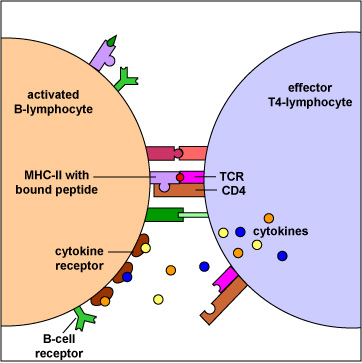
Exogenous antigens are those from outside cells of the body. Examples include bacteria, free viruses, yeasts, protozoa, and toxins. These exogenous antigens bind to B-cell receptors and enter B-lymphocytes through endocytosis. After lysosomes fuse with the phagosome, protein antigens are degraded by proteases into a series of peptides. These peptides eventually bind to grooves in MHC-II milecules and are transported to the surface of the B-lymphocyte. Effector T4-lymphocytes are then able to recognize the peptide/MHC-II complexes by means of their T-cell receptors (TCRs) and CD4 molecules.
This enables the effector T4-lymphocytes to produce cytokines such as interleukin-2 (IL-2) , interleukin-4 (IL-4), interleukin-5 (IL-5), and interleukin-6 (IL-6). Collectively these cytokines:
1) Enable activated B-lymphocytes to proliferate;
2) Stimulate activated B-lymphocytes to synthesize and secrete antibodies;
3) Promote the differentiation of B-lymphocytes into antibody-secreting plasma cells; and
4) Enable antibody producing cells to switch the class or isotypeof antibodies being produced.
Last updated: August, 2019
Please send comments and inquiries to Dr.
Gary Kaiser